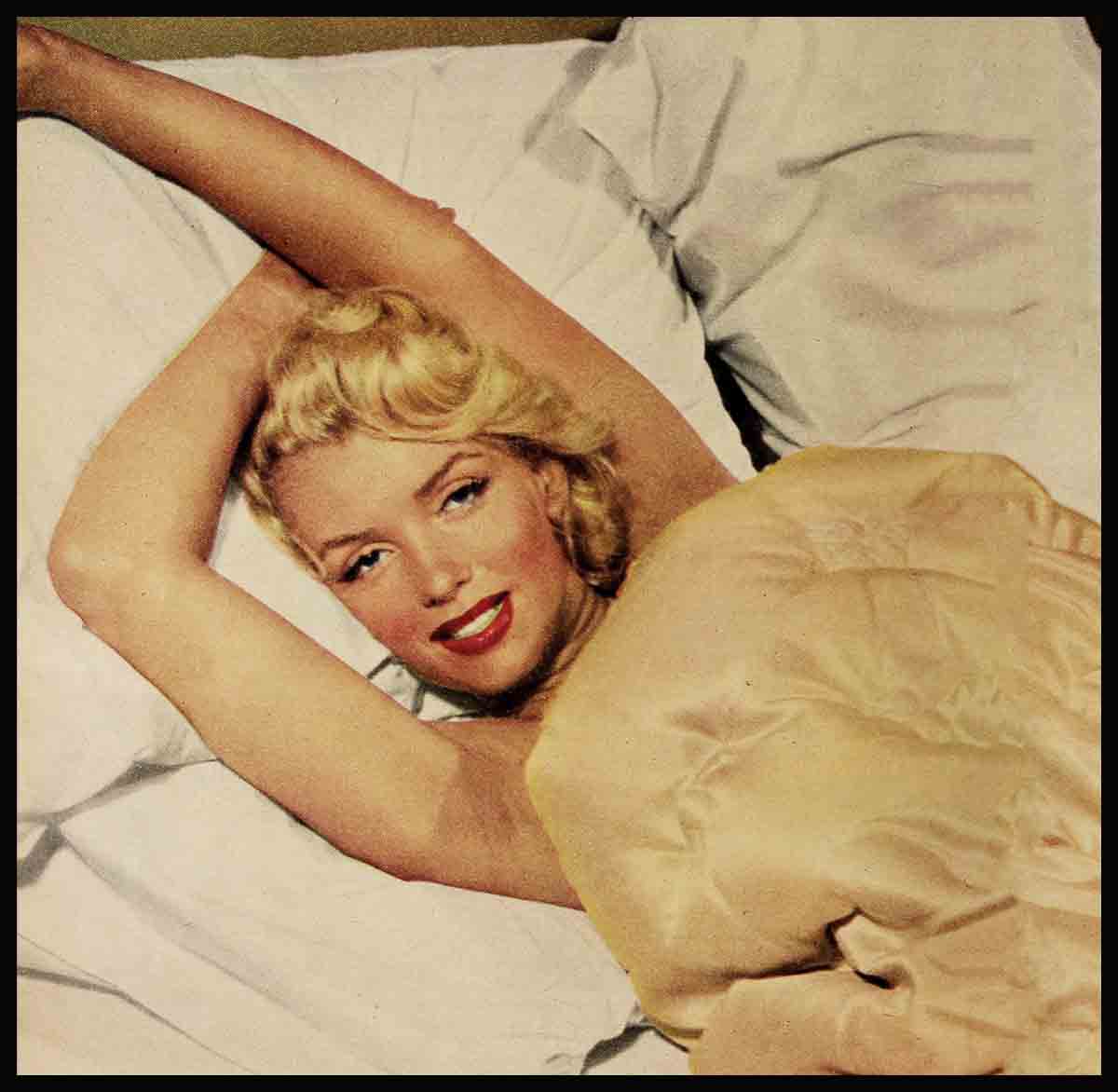
I Love Marilyn Monroe
Mr. Charles D. Saxon
Editor,
MODERN SCREEN
Dear Chuck:
In reply to your letter, it’s nice to be told that what Boswell was to Johnson I am to Monroe, but flattery will get you nowhere. I can’t do an article on Marilyn Monroe for you.
Don’t forget, Chuck, that when Boswell published his notes, Samuel Johnson was no longer around, and I still have to live with The Monroe. You know what I mean: I still have to see her at the studio, at restaurants, at her house and, of course, get lifts from her. No man ever had a better-looking chauffeur, or a chauffeur to whom other drivers paid more attention.
Look what you’ve got me saying: “I still have to see her!” This sounds as if it is a duty, which it certainly isn’t. I don’t know of any celebrity who is more amiable or more comfortable to be with than Marilyn. No, Chuck, if I can pull a line like that so early in just a personal letter, there’s no telling what boners I might pull in an article, Honestly, I don’t think I’m the boy for the job, despite the fact that I know Marilyn so well.
You probably want an article entitled “Why Monroe Will Marry DiMaggio,” or “Why Monroe Won’t Marry DiMaggio.” I can’t write that type of yarn for you. To tell the truth, Chuck I really don’t know whether Marilyn and Joe will marry or not. In fact, at the moment I don’t think they know. I’d hate to have to decide for them, and then find they’ve done the opposite and be caught with my by-line down. You know this sort of thing sometimes happens in fan magazines.
It could be because I understand Marilyn that I won’t hazard a guess as to her matrimonial future. But this much I can definitely state: there is nothing definite. However, at post time (I mean mailing this letter to you) this is somewhat their routine: Marilyn will often rush home from the studio, still in make-up, to cook dinner for Joe. She usually throws a couple of steaks or chops into the broiler. And Joe has taught her how to prepare spaghetti. Since going with him, she drinks Italian wine and knows a few words of Italian. After dinner Joe will stretch out on the couch and watch a Western movie on TV. Marilyn will study her lines for tomorrow, or talk to friends on the telephone. She prefers to lie on the floor or bed when on the phone. “I talk better lying down,” she claims.
Joe doesn’t try to guide her career or tell her how to play a role. He does occasionally make a sage remark drawn from his own glorious history: “Never mind all the publicity, honey,” he’ll say. “Get the money.”
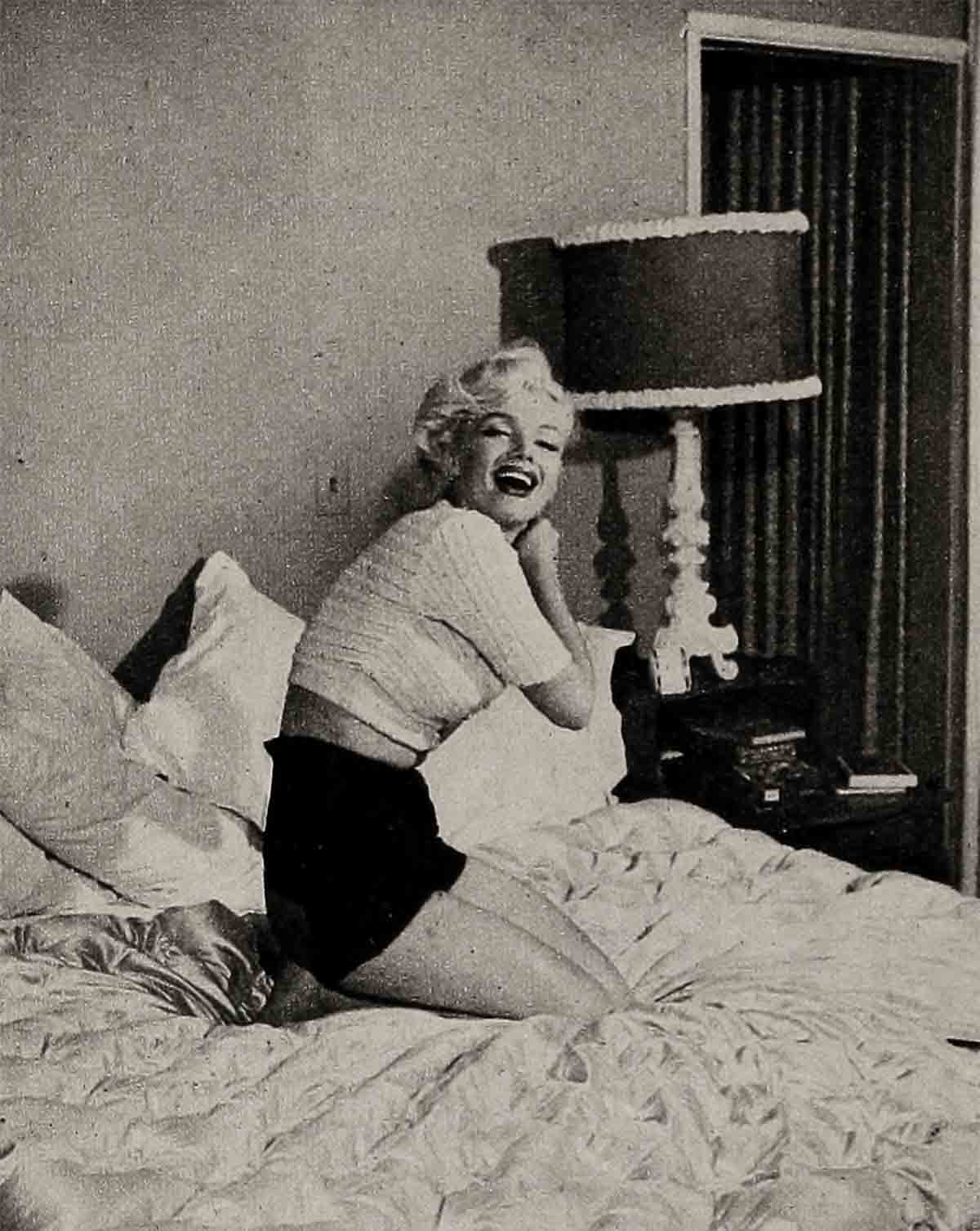
When Marilyn met DiMaggio all she knew about baseball was that it was played on a diamond and that it was good for publicity photos. It was because of one of those publicity pictures, in fact, that Joe expressed the desire to meet Marilyn. A little over a year ago she had posed with ballplayer Gus Zernial when he and his team were in Hollywood for spring training. “I never got to pose with such good-locking girls when I was playing ball,” said DiMaggio. Some months later David March, a mutual friend, arranged for them to have dinner with him at the Villa Nova restaurant. Marilyn liked Joe immediately. Let me tell you something about Marilyn, Chuck. She has great instincts. She can detect a phony, person or situation, almost at once. She’d much rather, and often does, stay at home by herself than go out out with some big movie star or producer or director. I know many who have asked her repeatedly—some of the names would shock even you—but she managed to avoid them all gracefully. If you’ll think back, you can’t recall one fake romantic item about her, and this is the general custom for starlets and young actresses being given the buildup.
When Marilyn and Joe first started going together, she was asked if she and Joe discussed baseball. She replied thoughtfully, “The subject has never come up.” Since then she has seen a few games with Joe but doesn’t quite dig it. She is not an outdoor sports enthusiast.
It has really never mattered to her that Big Joe (that’s what Marilyn calls him) was one of the truly great ballplayers of all time. What impressed her much more was an incident that took place last Christmas Eve. Marilyn had attended the studio’s annual Christmas party, appearing gay, seeming to be enjoying herself. Then she left, with nothing to do but to return home—at that time a single room at the Beverly Hills Hotel—and wait for a phone call from Joe, who was visiting his family in San Francisco. When Marilyn entered her room she found a miniature Christmas tree standing on the table, a pasteboard sign on which was handprinted: “Merry Christmas, Marilyn,” and Joe sitting in a chair in the corner.
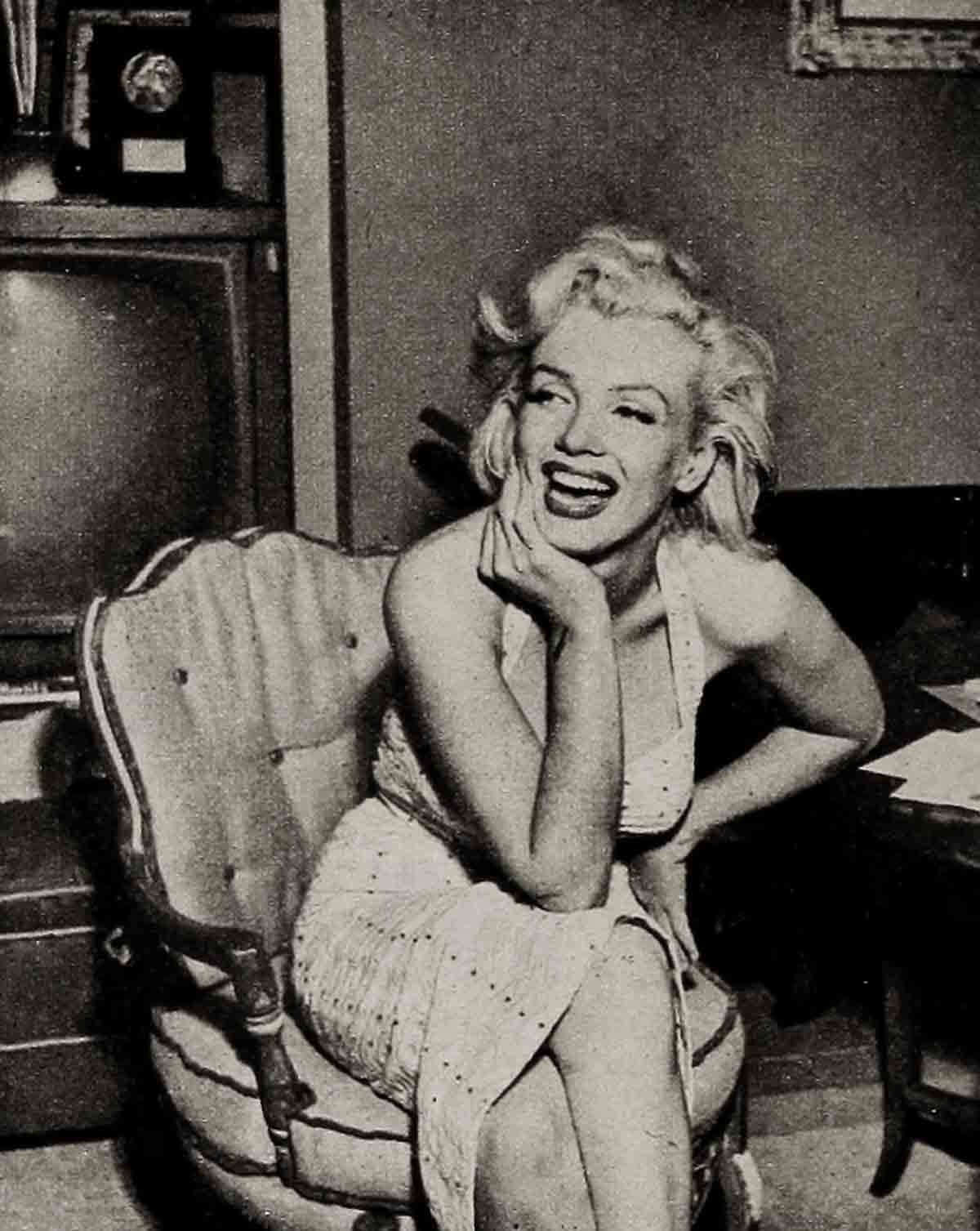
“It’s the first time in my life anyone ever gave me a Christmas tree,” she told me days later. “I was so happy I cried.” This from the blonde who sings “Diamonds Are A Girl’s Best Friend.”
This isn’t the kind of sensational story I suspect you’d expect about a girl who can take a conventional product like a calendar and turn it into the talk of a nation. Maybe it’s because I know Marilyn so well and am so close to her (there I go again with the kind of remark that could be misconstrued in an article!) that I can’t do the type of story I believe you want. Often, Chuck, I find that if I know people too intimately I can’t write about them as well as if I don’t know too much about them. Does this ever happen to you?
It’s a unique kind of friendship that Marilyn and I have. Just how it started, I don’t know. Nor does The Monroe. We were discussing it the other evening, and neither of us could place the occasion when we first met, or how we took to each other. I guess our association, like Topsy, jes’ growed.
All I can definitely recall is that the first time I met her I told her she was going to be a movie star—one of the biggest the screen has known. And during the first year or so of our acquaintance, I remember, we were standing in front of the magazine rack at Schwab’s and Marilyn was looking longingly at the row of fan magazines. She asked, “Do you think I’ll ever have my picture in one of them?” Now, with her kisser on practically every magazine cover and pictures scattered throughout every magazine, it doesn’t seem possible that there was a fan magazine without her picture, does it?
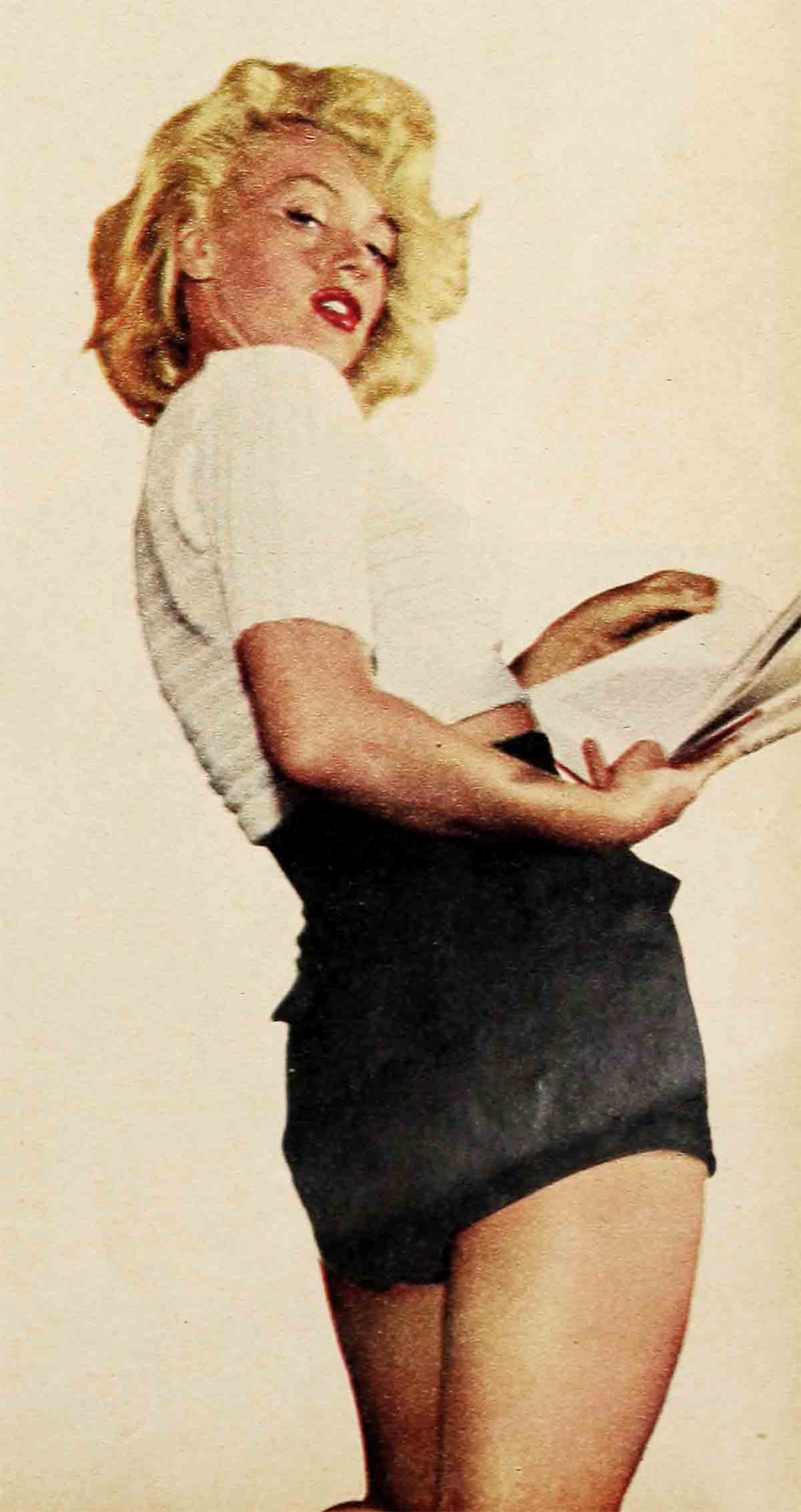
In your letter you asked me to explain how the bit about pinch-hitting for Joe DiMaggio started. Well, that’s something I can do, Chuck, because it’s a-piece of personal info that’s strictly for a letter. It was late in the afternoon and I was in my office when Marilyn phoned and asked me if I would escort her to a dinner given by a fan magazine at which she was to receive her first important award. Many more would follow, but I guess the first always has a special significance. I had already made my excuses to the magazine editor, for I had a great deal of work to do. “What’s the matter with Joe?” I offered. “You know he doesn’t like to go to those big public affairs. And besides, I’d rather you went,” she said. And she said it in that soft, seductive voice of hers and of course I said yes. I’d like to hear you say no, Chuck.
Before Marilyn arrived I was paged. She was calling from the studio: “I’ll be a little late. They’re sewing my dress on me, I’ll explain later.” (Marilyn is always late. She once phoned an interviewer at the exact time she was supposed to meet him and asked him to postpone their date an hour so she wouldn’t be late.) Anyway, Marilyn finally arrived, wearing a gold evening gown that both raised and lowered the gold standard at the same time. I knew immediately what she had meant by “they’re sewing my dress on me.” It was not something she had slipped into.
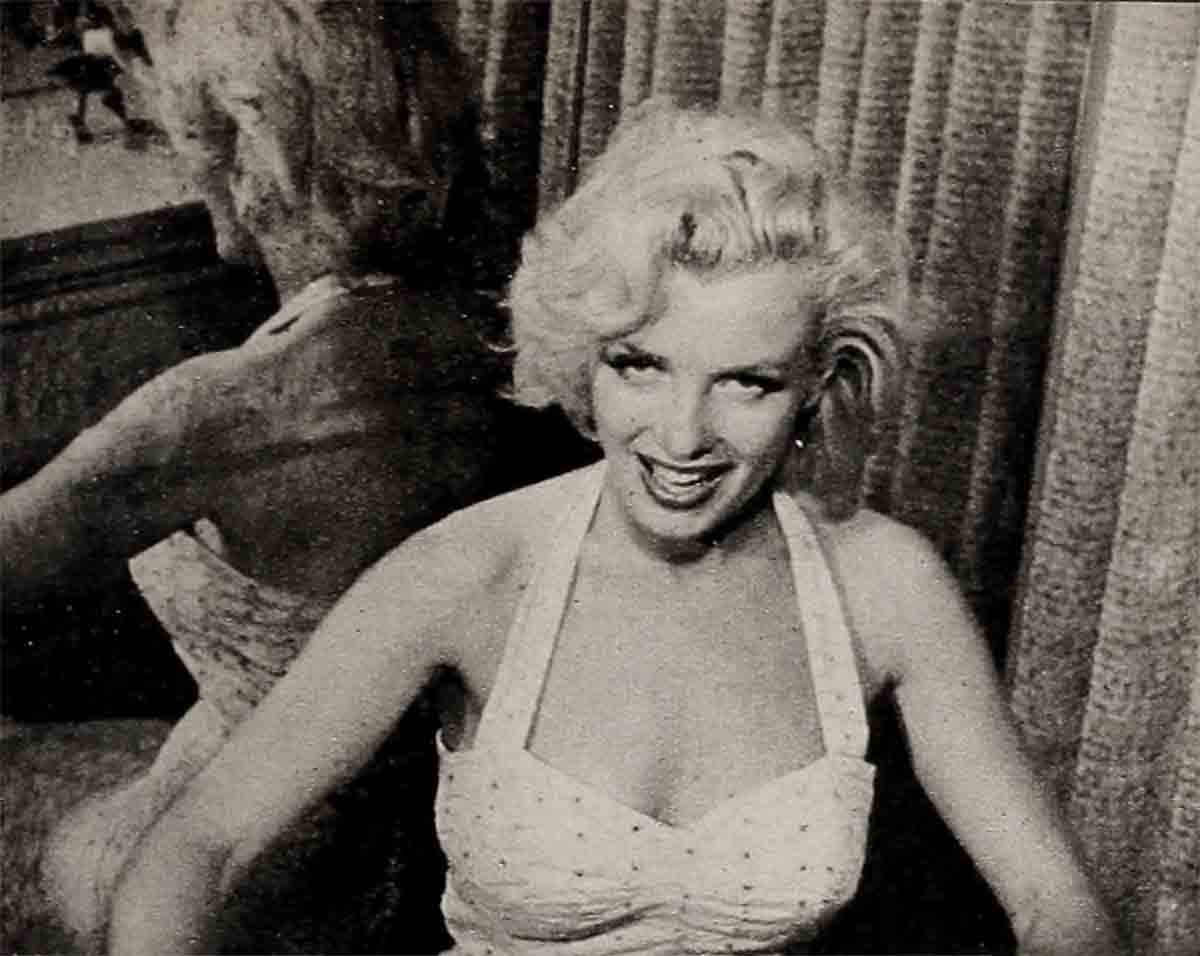
As Marilyn and I walked toward the banquet room, I asked why she had insisted I accompany her. She told me she likes to be with me because she feels comfortable, That’s a big thing with Marilyn—feeling comfortable. She gets a sense of security and a conviction that she “belongs” from it. Maybe Ill tell you more about this later, Chuck. But there was another reason The Monroe wanted me with her this particular evening and it was revealed very soon. She was asked to pose for the newsreel cameras receiving the award, and the man in charge wanted a studio official to stand next to her and In that soft, almost pleading voice of hers, Marilyn said: “I’d like Sidney to be with me in the newsreel. You see, he had faith in me when I could only dream of evenings like this. I’d feel-much better if he were standing with me.” You probably saw this newsreel, Chuck, but never noticed me. I tell you the incident because it’s the beginning of the “pinch-hitting”; but I happen to like it, too, because it demonstrates Marilyn’s loyalty.
Well, my boy, you have no idea what this pinch-hitting role did for me! I must have hit the ball out of the park, because soon I was known as Marilyn’s pinch-hitting escort. Mickey Mantle can take DiMaggio’s place with the Yankees—I much prefer to take his place with The Monroe. It’s to be expected that more fellows would say hello to me than ever did before, but what I wasn’t prepared for was the reaction of the ladies!
Glamor gals who had previously looked upon me as merely a short, dark, bespectacled fellow with a pencil, looked at me through different eyes. I became a glamor boy. It’s to laugh, isn’t it? Not only did some of the most important and loveliest actresses in town want to find out what Marilyn saw in me, but—and this is the pay-off—they wanted to prove to me that they were more—shall I say—attractive than Monroe! I won’t mention names, even in a letter, so don’t get excited and write me that this angle might make a good magazine piece. A gentleman doesn’t tell such things.
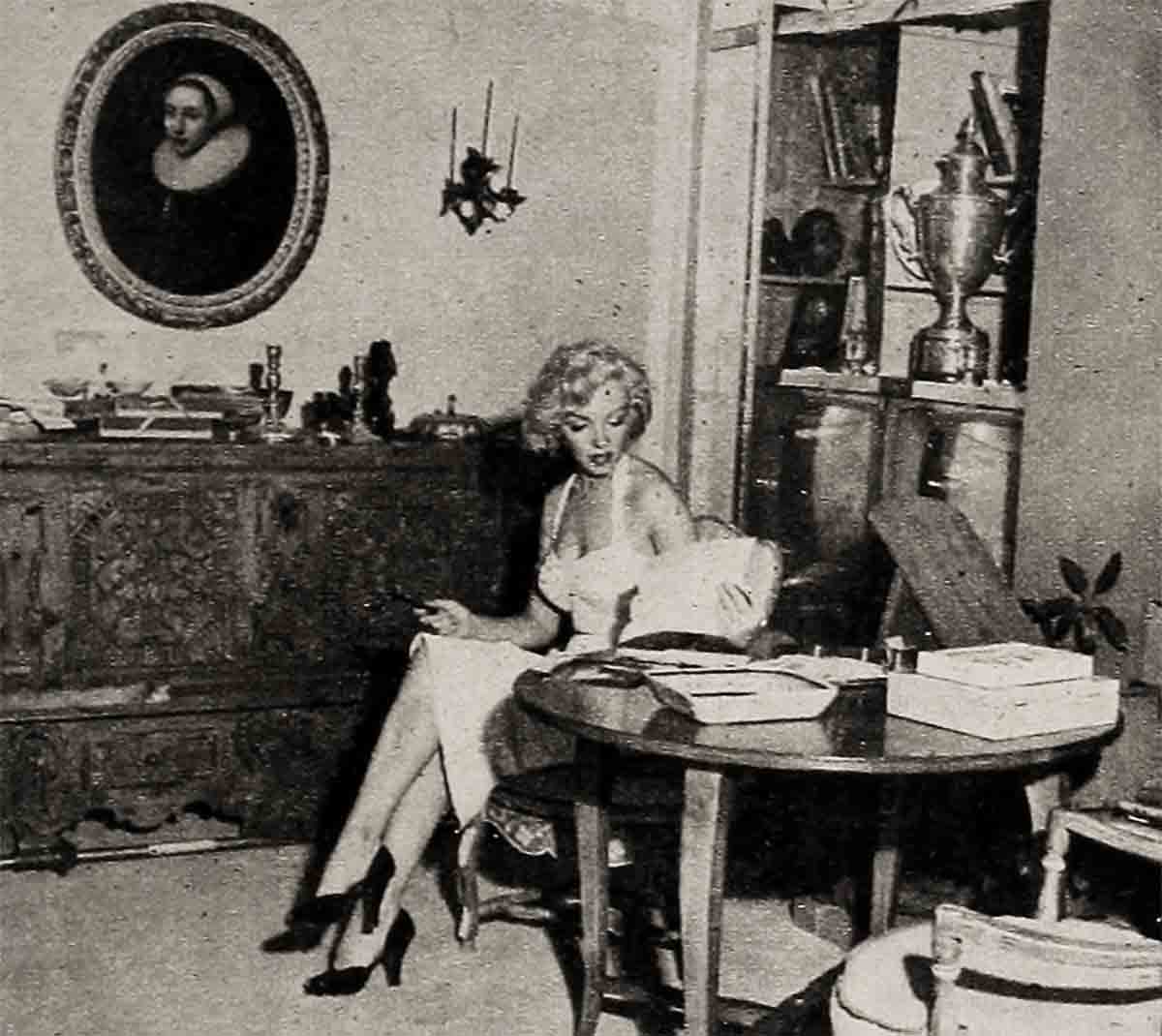
I did tell Marilyn about this, however (we tell each other everything), and she was quite amused. Marilyn doesn’t think other girls like her and she prefers the company of men. “Men understand me,” she says. She is probably right, but to be more accurate, she should have said that she understands men. Marilyn has also said, “The luckiest thing that ever happened to me was being born a woman.” In this she is undoubtedly right, but again, it is just as accurate to say that it’s a lucky thing for men, too.
But The Monroe is off-base in her belief that women don’t like her. If she gives them half a chance to know her, they always do. Take her relationships with Jane Russell and Betty Grable, for example. You’d think she and Jane and she and Betty would be at each other like cats. Some fan magazine even ran articles about Marilyn’s feud with Russell, and others tried to promote a feud. (I can hear you, Chuck, saying: “Why I Like Jane and Betty, by Marilyn Monroe, as told to . . .” But I’m not your boy for that type of assignment. I couldn’t stretch it and make it sustain for an article. I’ll tell you the facts, and I think you’ll see it my way.)
When Russell, under contract to the Howard Hughes Tool Company, came over to Twentieth Century-Fox Studios to make Gentlemen Prefer Blondes, she arrived with all the fanfare and justified importance of a visiting celebrity. Hughes was shrewdly protecting the most glamorous product of his tool company. He had clauses in the contract which provided for Jane to bring her own cameraman, Harry Wilde; her own make-up man, Lane “Shotgun” Britton; her own hairdresser, Stephanie Garland; and her own wardrobe girl, Mary Tate. Well, this is like Rocky Marciano going into a fight with lead in his gloves.
It would be absurd to say that Marilyn wasn’t disturbed and worried by this. In plain words, Marilyn didn’t like it. For the first few days on the picture Marilyn and Jane merely greeted each other cordially and stayed with their respective friends. This situation existed because neither knew how to break the ice.
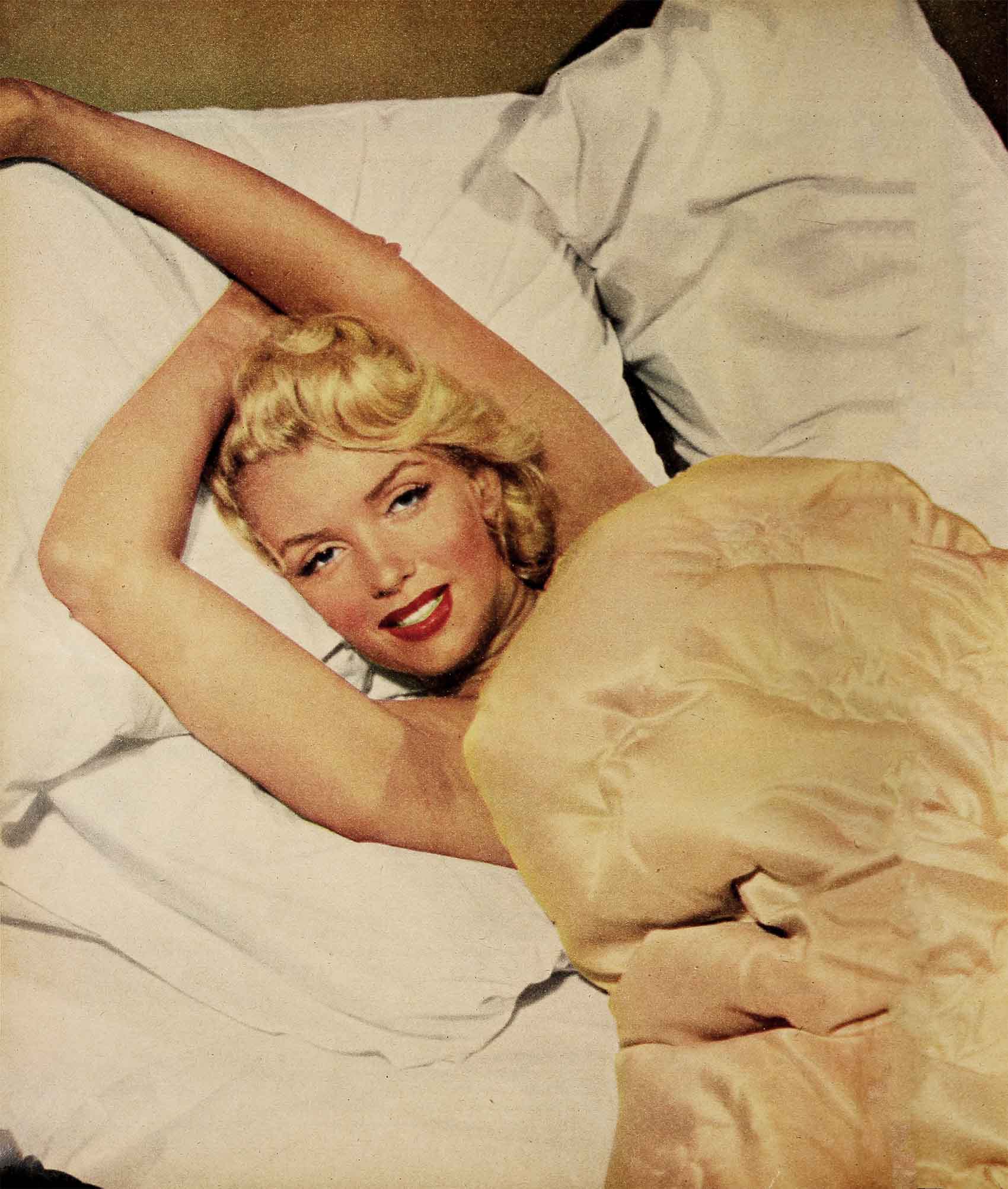
The ice was finally broken when, while | rehearsing a scene, Jane and Marilyn offered each other suggestions. This led to their speaking about their mutual interest in ball players. “Only they play different kinds of ball, don’t they?” asked Marilyn. Bob Waterfield came on the set several times and met Marilyn, but DiMaggio never visited. Ultimately Jane and Marilyn became very friendly and Marilyn even attended two of Jane’s religious group meetings. “Jane tried to convert me to her religion,” Marilyn related later, “and I tried to interest her in Freud.”
By the end of the filming, Jane and Marilyn were real friends—buddy-buddy. When anyone would say to The Monroe: “Watch out for Russell. She’s got her own cameraman, etc., etc.” Marilyn’s moist lips would move into smile position. Then she’d say: “Oh, I have the title role and that about evens things.”
Marilyn honestly likes Jane Russell and Betty Grable. “Betty is the most real girl I’ve ever met,” Marilyn says. And there were plenty of reasons for a genuine feud to develop between these two glamor packages. As you well know, Chuck, Betty was the Queen of the Lot until the unprecedented avalanche of Monroe publicity dethroned her. No person likes being the victim of this and few can tolerate it. But Grable is quite a person. She is sharp, honest, has all the answers and knows the score.
During the few years Marilyn and Betty were at the studio together, their only encounter took place when they chanced to pass each other as one was walking to wardrobe and the other from wardrobe. They nodded, that’s all. They never actually met until they were cast in the same picture, How To Marry A Millionaire.
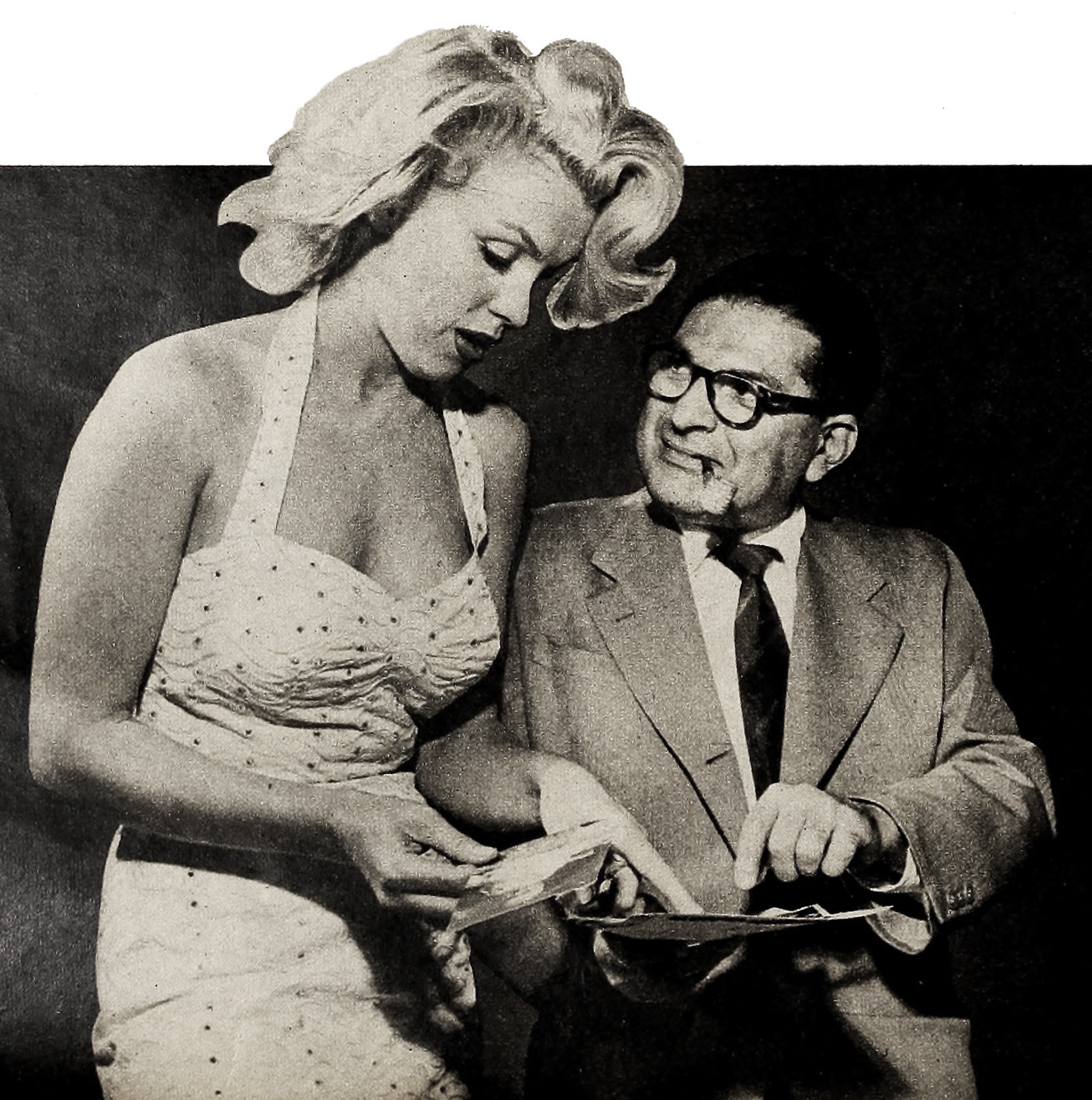
Again Marilyn was frightened. She wanted Betty to like her. (She wants most people to like her, but especially Betty, who had been her favorite for years. Marilyn had wanted to be a star like Grable or Lana Turner for so long that she ached from the desire.) I don’t know Grable’s first words to Marilyn, but somewhere in their initial conversation Betty told Marilyn: “I’ve had it. Go get yours. It’s your turn now.”
Throughout the filming of How To Marry A Millionaire, Marilyn was simultaneously trying to get Betty to like her and trying to reassure herself that Betty did like her. Driving me from the studio one evening, Marilyn said excitedly: “Betty told me today that I’m the first actress who never tried, even subconsciously, to upstage her. I guess this means she likes me. I hope so.”
Another time I was on the set when Marilyn was playing a scene in which she had to nudge Grable. She did and Betty fell on her fanny! Marilyn was all apologies. “I’m so sorry!” she said. “I didn’t think I had pushed you so hard!” “It wasn’t your fault,” Betty replied lightly. “I was standing on one foot.”
Marilyn was so distressed by this accident that later, doing another scene, she carelessly stepped on Betty’s shoe. “I know this was my fault, and I’m terribly sorry!” she apologized. “It’s nothing,” Betty said. “But I dirtied your shoe!” persisted Marilyn. “Forget it, will you, kid?” said Grable. “The shoe doesn’t show in the shot—and besides, it belongs to wardrobe.”
Betty and Marilyn sincerely like each other and have visited together several times since filming en the picture ended, which is an indicator with Marilyn.
Now Chuck, because I’m kind of thinking out loud about The Monroe, I don’t want you to consider this a commitment for an article. It’s just my way of looking her over carefully (See? Its almost impossible to write about Marilyn without saying something that will have a double meaning) for you. Of course you wouldn’t want an article about the now too-famous calendar; there’ve been too many. Yet there’s a hunk of truth about the calendar incident which reveals a side of Marilyn never known before. (There! Another double-meaning sentence without intending it.)
AS A CHILD, SHE WASN’T OFTEN WITHIN CAMERA RANGE. SHE SHOWS HER ONLY BABY PICTURES TO SIDNEY AND TO MODERN SCREEN.
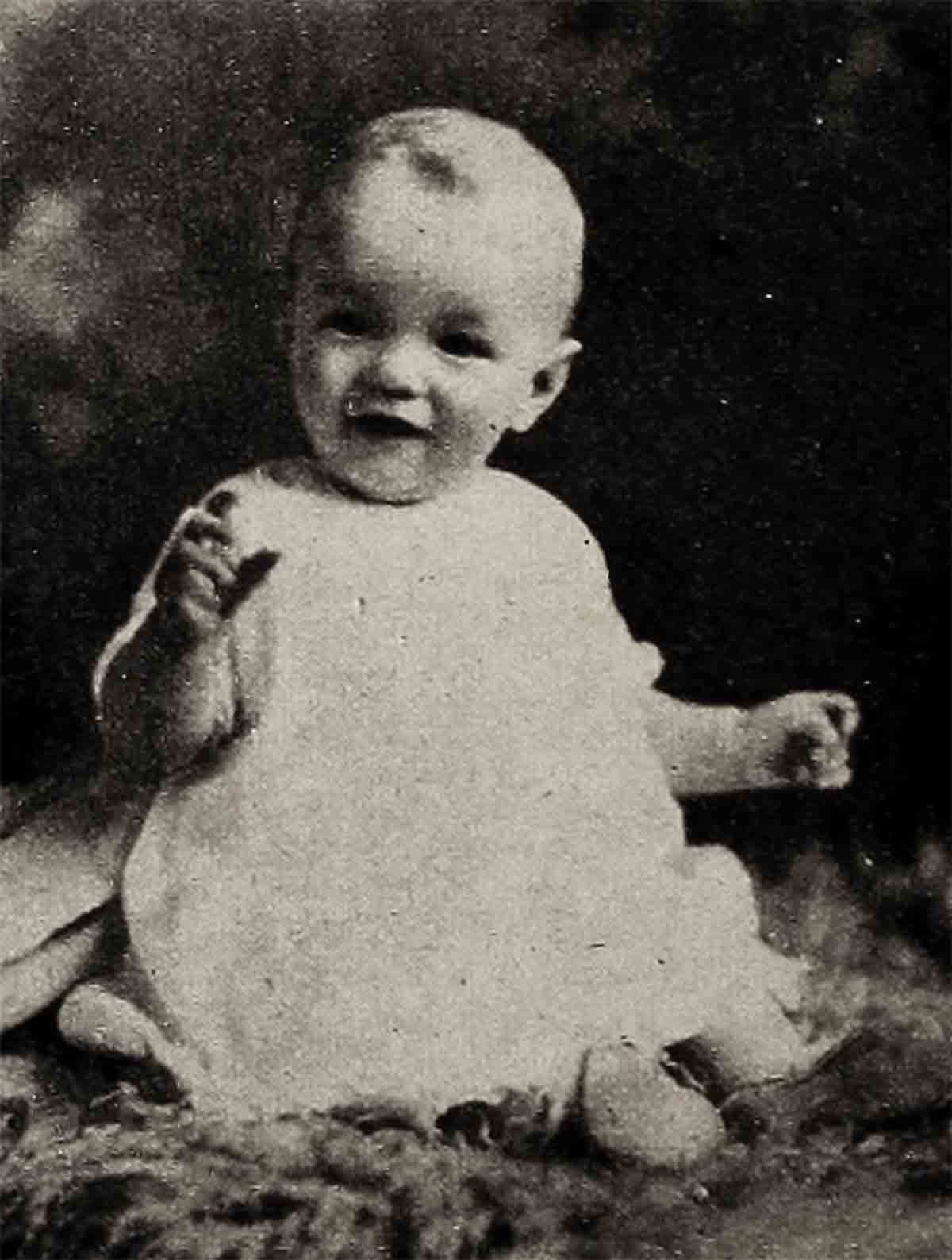
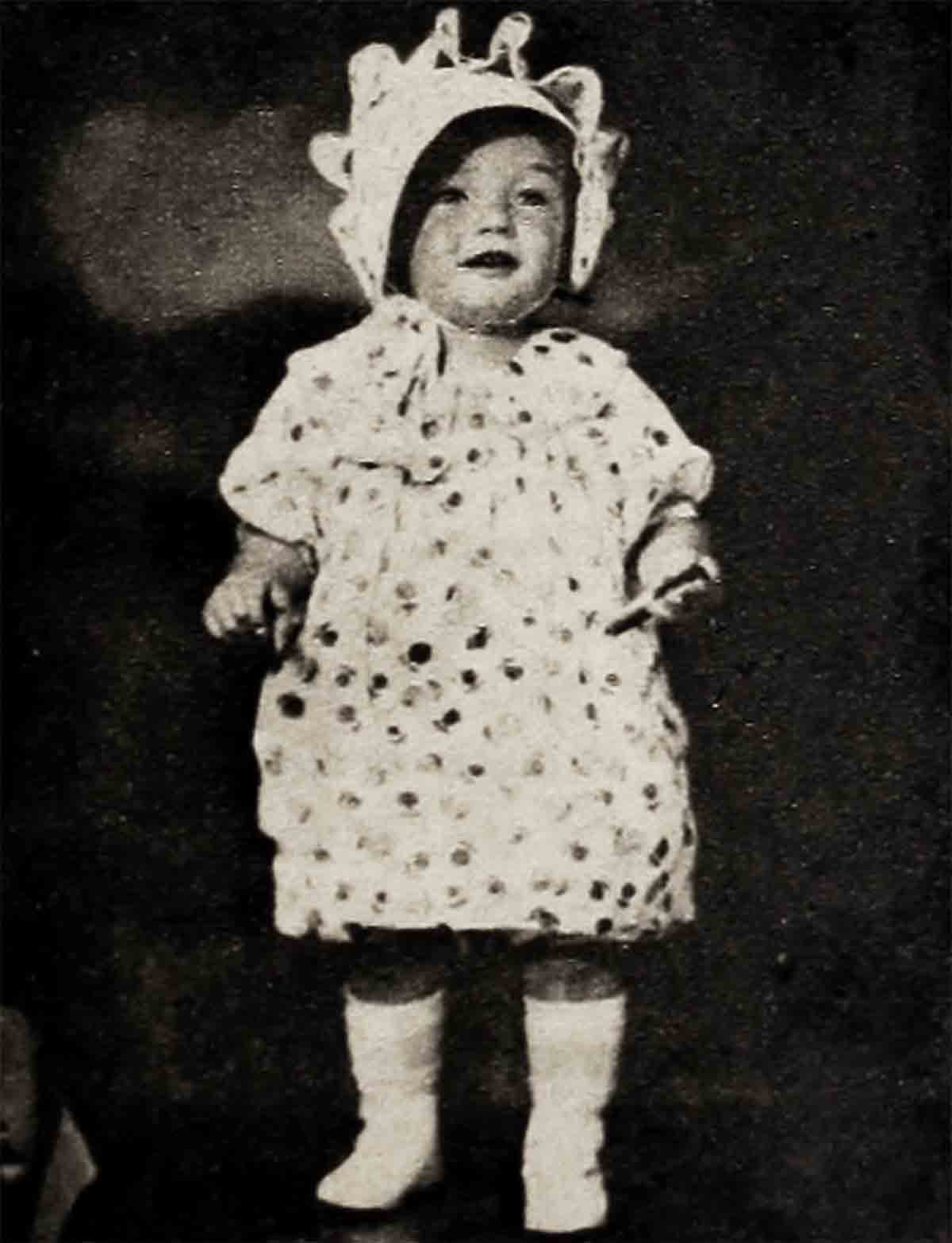
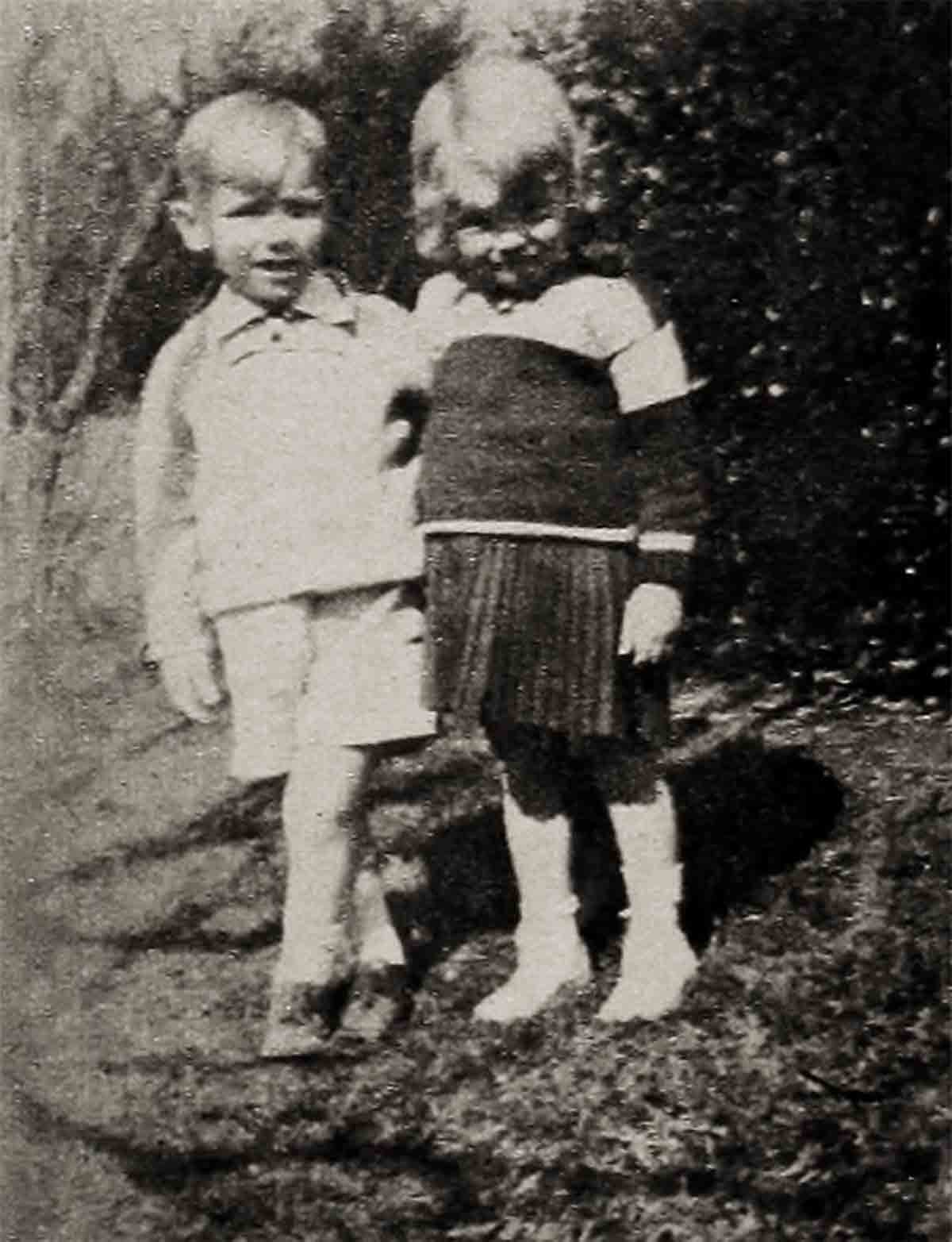
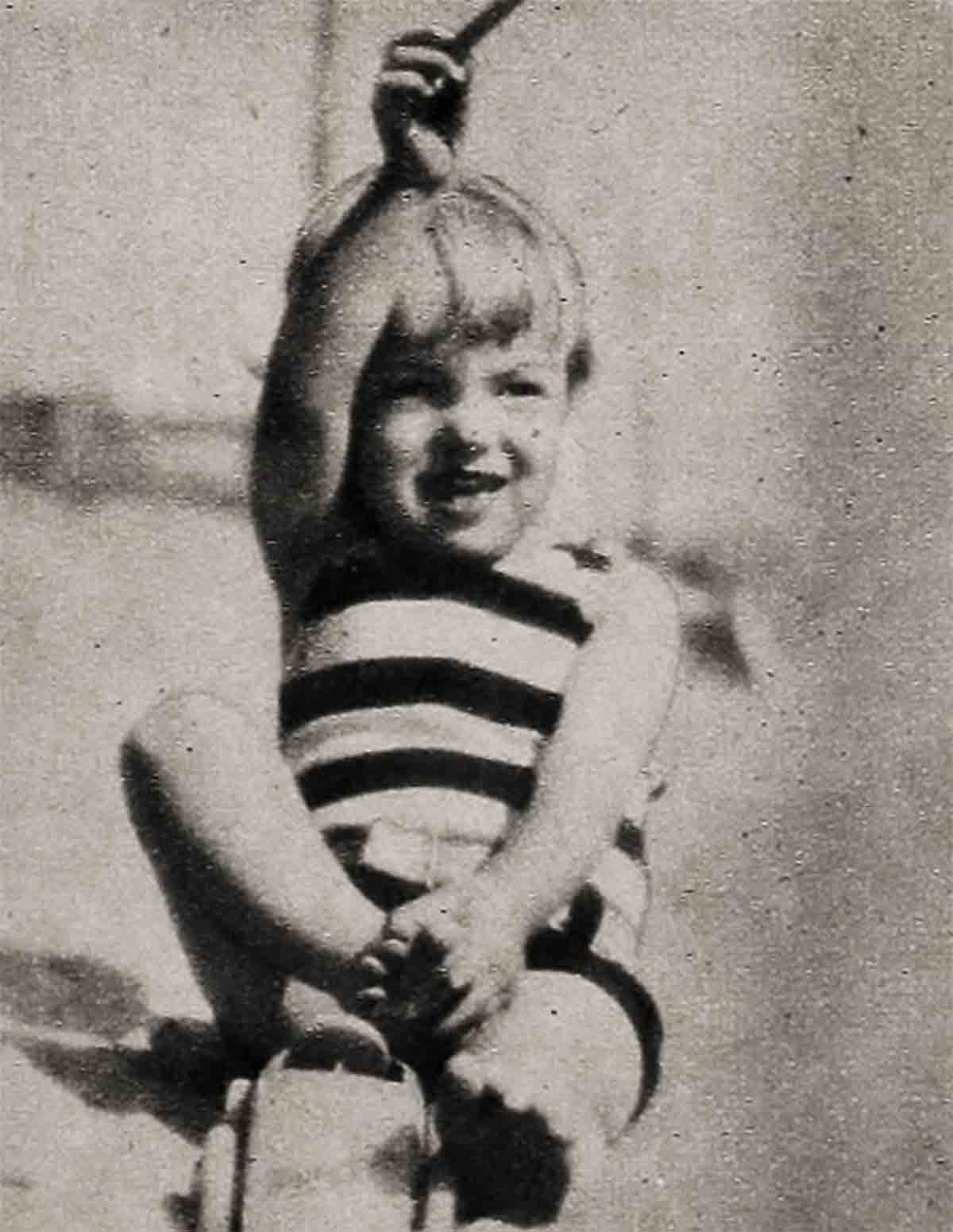
Marilyn phoned early one morning and there was panic in her voice. The story of her and the calendar was going to break. (I had known about it, but it was one of our secrets.) “Oh Sidney, what shall I do about it? What shall I do?” There was a pause; I was thinking. Marilyn was impatient. She broke in: “I’ve been advised to deny the whole thing. To say it isn’t me. I’ve also been advised to think up a good excuse for having done it. Do you know one?”
I wish I could say that I carne to her in this critical situation, but I can’t. I said: “Calm down a minute, and tell me how you really feel about the calendar and posing in the nude.”
She replied: “I don’t feel ashamed. But now I’m scared . . . My whole career can be ruined . . . But I didn’t do anything bad . . . I didn’t think so then and I don’t think so now . . . If I had thought so, I wouldn’t have done it . . . I needed a job and money to pay the rent . . . Lots of other girls were doing it . . . There’s no law against it . . . They’re trying to make me feel ashamed, but I’m not . . . . Can’t I just tell the truth? . . . I know I wouldn’t condemn anyone who told me this . . .”
“Marilyn,” I said, “you have solved your own problem. Just tell everyone what you’ve told me.” This was my contribution: listening to Marilyn long enough for her to talk out her problem. I’ll bet on The Monroe’s instincts and honesty every time.
And Chuck, you know what happened as a result of Marilyn’s own explanation. She turned what could have been ruination for her into a triumph. She won the public’s sympathy and they began to love her. Marilyn has never been troubled by the calendar incident since, and both she and her studio now regard it with humor. A few months ago I was in the office of a publicity man at Twentieth Century-Fox and couldn’t help noticing there on the wall a calendar with a photograph of a gorgeous nude who was captioned “The Flame Girl.” Marilyn wasn’t honored even at her own studio. “Why don’t you have a Monroe calendar instead of an outsider like ‘The Flame Girl’?” I asked. The publicity man answered: “That’s what Marilyn wanted to know.”
I trust you realize from the way Marilyn handled the calendar bit that she is a very smart chick. She’s not all physical. She’s brighter than most people think. They mistakenly go along on the assumption that if you’re blonde and not out of shape, you’ve got to be dumb. Don’t sell our little girl short: she knows what she’s doing every minute. For example, she has learned through experience to wait until the interviewer puts pencil and paper away to say what she really wants quoted. I would say that her seeming helplessness is her strength. She can take care of herself. I’d bet, and give big odds, that if Marilyn were placed alone on a desert island, somehow a man would appear.
“All right,” I can hear you saying, “You’ve convinced me. Marilyn is smart as well as beautiful. But what’s with the article? We sent a staff photographer to her apartment to shoot some special art work. There must be an article on her by you!”
No, Chuck. Did you ever stop to think that maybe I’m not Boswell? Maybe I’m Pythias. And did he write about Damon? I was in Marilyn’s apartment that evening when your photographer arrived. I was listening to Marilyn play her guitar and sing. Then I watched the photographer shoot a layout. It’s quite a job posing for pictures. The average reader picking up a magazine might say, “Oh, another picture of Monroe” and flip the page. Well, it took from nine until a little past midnight to get those pictures. Marilyn’s performance impressed me. She not only knew her best angles but she knows the best angles for the photographer. She knew if the light was casting a shadow across her. She was aware of minute details, such as what part of her thigh the blanket should cross. She even combed her hair so it would look uncombed. She doesn’t leave it to chance that photographs of her will be interesting.
Marilyn doesn’t stand in front of a mirror for hours practicing poses, as some people believe. But she does take a long time making up and dressing, considering the few clothes she is alleged to wear. She doesn’t own a girdle, but when she considers it necessary—which is oftener than she is given credit for—she does wear panties and a bra. It’s usually a flesh-colored bra and black panties. She kicks off her shoes the moment she enters her apartment. She sleeps in the raw, or as she has been quoted: “I wear nothing but Chanel No. 5 to bed.” She claims she wears it to bed because “it makes sleeping dreamy.”
A bed has always been important to Marilyn. (It’s dat ol’ debbil double meaning again.) Ever since she was an orphan kid she wanted to own her own bed. With the first money she ever saved she bought herself a bed. No matter where she lived—apartment, hotel or house—she would have this bed. When she didn’t have a place of her own or was traveling, she would put the bed into storage. The upkeep of the bed far exceeded its original cost. It was a low bed, close to the floor, because as a child Marilyn was a restless sleeper, frequently had nightmares and would fall out of her bed and onto the floor. As you can see in the photos, Marilyn recently treated herself to a new bed. It is higher—not so close to the floor—because Marilyn is more sure of herself.
Don’t get the idea, though, that Marilyn is taking it big: that she’s bubbling over with confidence. Just the opposite; she could use a lot more of it. Back in the beginning, she wanted to be a movie star more than anything else.
She did become a movie star, and what a movie star! Oozing glamor like the great movie stars of yesteryear, when the movies were magic. You’ve got to admit it, Chuck, The Monroe has done more for Hollywood and motion pictures than any individual in a decade; for she created a spate of fresh interest on the part of a public growing weary of familiar faces, a public no longer believing in glamor.
At the preview of Gentlemen Prefer Blondes, I was again pinch-hitting for DiMaggio. Marilyn and I have an agreement, Chuck: if DiMaggio is ever taken out of the line-up, I can continue as pinch-hitter. Before the picture flashed on the screen, Marilyn whispered to me in that low, sexy voice that is natural with her: “Hold a good thought for me.” She always says that when embarking on a venture. She feels much better when you tell her you will. So don’t forget this, Chuck.
Marilyn didn’t like the way she looked on the screen, especially her hair. She didn’t think she had done the scenes and many of the numbers as well as she should have. She liked herself, especially her hair, in the “Diamonds Are A Girl’s Best Friend” number. She genuinely enjoyed Jane Russell and actually laughed aloud at a few of Jane’s remarks.
I’m telling you all this, Chuck, in case you’d like to know (strictly for yourself and maybe to whisper to the wife) how Marilyn reacts to herself on the screen. But again, you and I know there isn’t a magazine article in it. I could go on to tell you how hard Marilyn works at her job and it would be all I could do to get you to believe it.
I know it’s not good magazine copy that, despite nature’s bounty, she works as hard at self-improvement as. any other actress in town. She takes dramatics lessons, singing lessons, and is also grooming herself to appear in a play. The first charge account she ever opened was at Marian, Hunter’s book shop in Beverly Hills. She buys books on self-improvement, psychology, the latest plays, poetry, and practically everything on Abraham Lincoln, who is her special hero. She’ll never tell you that she has read a certain book or has seen a certain movie, but during the course of a conversation, when the book or the movie is mentioned, she will make a pertinent comment. She is a secret reader and often sneaks off to the movies by herself.
Marilyn has her own special dramatic coach, Natasha Lytess, who is with her on every picture. Though she seldom makes a movie without Natasha, don’t get the notion (as some studio people have) that Marilyn is a Trilby. Not so. This relationship is merely another example of Marilyn’s loyalty, as well as of the fact that she never stops working at trying to become a fine actress. All the publicity, the acclaim, the marquee signs may thrill her, but they don’t fool her.
Natasha was the dramatic coach at Columbia Studios, back when Marilyn worked there. Natasha was kind to her and gave her words of encouragement. Marilyn hasn’t forgotten, and since she feels she requires coaching she has insisted on Natasha Lytess.
Marilyn can be standing still on the set and at the same time be going off in all directions. She needs someone with her whom she believes is taking a special interest in her, to take her aside and offer Suggestions and reassurance. She likes most of her directors, but cannot help feeling slighted because they don’t devote all their attention to her. Often it takes the directors and performers a while to become adjusted to this in her. Many believe she is putting on an act. The truth is she is working desperately hard both trying to make good and trying to make everyone on the set like her. During Clash By Night, the set workers had to explain to her that by the term “equipment” they meant the camera, sound boom and other paraphernalia of picture making. Because when the assistant director yelled to Marilyn: “Watch out for the equipment!” she demurely zipped up her sweater.
There was a scene in Love Nest that required Marilyn to enter her apartment and leisurely disrobe for a shower, unaware that the hero, Bill Lundigan, was asleep on a couch in the room. Just as she had stripped down to her flimsy underthings, director Joe Newman stopped the scene. Marilyn looked startled and frightened. “Did I do something wrong?” she asked.
“No, honey,” replied Newman. “You were perfect. But Lundigan was peeking!”
Marilyn is exceptionally moody and given to long periods of solitary introspection. She blames this on her lonely childhood and the fact that in her entire life she has known only a few couples in whom she could confide. I know from our chats while you visited Hollywood, Chuck, that this isn’t the kind of thing for fan magazines, but I only mention it because it is The Monroe I know; and strange as it seems, Marilyn Monroe and the fan magazines don’t mix. That’s a honey, isn’t it?
Regardless, I must tell you the piano story. Of all the folks Marilyn lived with as a child, her favorite and the one of whom she has the fondest recollections is the woman she called Aunt Ana. Aunt Ana was warm and maternally affectionate toward Marilyn. Some of their happiest hours were spent around the piano, the family’s proudest possession. For this piano was said to have once belonged to Fredric March. Many years later Aunt Ana died and willed this precious piano to Marilyn. Although Marilyn often was not working and didn’t have too much to eat, she had a piano, even if she had to borrow the money to pay for its storage. Now that Marilyn is in the chips and has her own apartment, the piano has been given a face-lift and occupies most of the living room. What’s more, Marilyn can play almost two songs on it.
In answer to your main question, Chuck—what do I personally think makes The Monroe sexy?—I don’t think you would print the answer. But I’ll try tell you in this letter.
It’s obvious that Marilyn is a well-stacked, well-proportioned, unwrapped box of glamor. There are her red lips, always moist, there’s the. back of her hair so arranged it appears to have a permanent pillow dent; in fact everything about her spells out sex and everybody seems to get the message. But I get a special message, and it’s the clincher on why I shouldn’t do that article for you.
I happen to know that The Monroe’s biggest sex appeal is an accident. What is she most famous for? What feature has been most imitated? Her walk! In Niagara they held a camera on her walk longer than on any other walk in cinema history. It evoked much discussion, pro and con. For Marilyn doesn’t just walk: she wiggles, snake-hips, bumps, twists and slithers all at the same time. She has been described as “The Girl With The Horizontal Walk.” She is the only performer in show business who makes her greatest entrance when. she exits.
Yet Marilyn, when she walks, isn’t trying to be sexy—believe me. She broke her ankle when she was a youngster and tried to walk so as to favor that ankle. The ankle is still weak, and the walk has become a habit. That’s it. Marilyn is only doing what comes naturally, and my, how the natives have gone for it! You see, there are some things about sex that even Dr. Kinsey doesn’t know.
In closing, let me ask you something, Chuck: what is there to write about Marilyn that hasn’t already been written? Someone will have to invent a new life for her. Honest, Chuck, I’m not your boy. Maybe you ought to hire an inventor. But seriously, I want to remain friends with you, so why don’t you think it over and then drop me a line saying that you agree with me that I can’t do a fan magazine article on Marilyn Monroe?
Best wishes.
Sidney Skolsky
Dear Sidney:
You may not know it, but you just did what we consider a good fan mag piece on The Monroe.
Kindest regards.
Chuck Saxon
THE END
It is a quote. MODERN SCREEN MAGAZINE OCTOBER 1953




